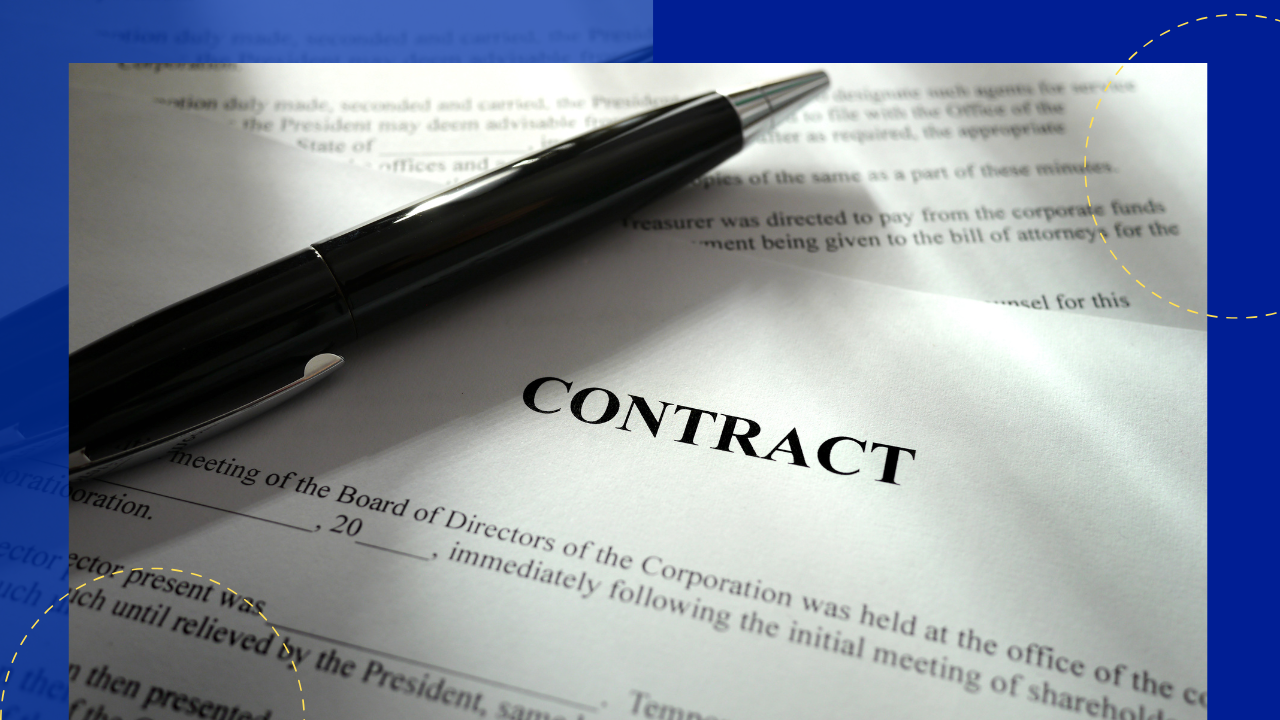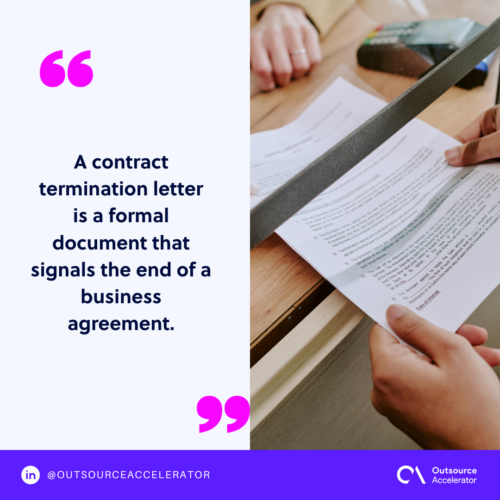8 Essentials of a contract termination letter template

Ending a business relationship is never easy, but it’s sometimes necessary. Whether it’s letting go of an underperforming employee, ending a contract with a difficult client, or parting ways with a vendor that no longer meets expectations, contract termination is a routine part of business operations.
Clear communication and proper documentation help reduce misunderstandings and protect the company from legal risks.
A well-structured termination letter provides a formal record and sets the tone for a professional exit. It should communicate the reason for termination, reference the original agreement, and outline any final steps.
Omitting critical details or employing vague language can result in confusion or disputes.
This article covers the eight essentials of a contract termination letter template, what to include, how to structure it, and why each element matters.
Let’s get started.
What is a contract termination letter?
A contract termination letter is a formal document that signals the end of a business agreement. The contract may involve a client, employee, vendor, and/or service provider, and the letter serves as written confirmation that outlines when and why the relationship is ending.
It also protects both parties from misunderstandings and provides clarity on any remaining responsibilities.

Considerations before curating a contract termination letter
Writing a contract termination letter requires more than a formal message. It’s a legal document that can impact relationships, compliance, and reputation.
Before sending one, businesses should take the following few key steps to avoid costly mistakes:
1. Review the contract terms
Before drafting the letter, review the original agreement, especially the termination clause. Confirm the required notice period, grounds for termination, and any obligations tied to the exit.
Overlooking these details can lead to disputes or legal consequences.
2. Maintain a professional tone
A termination letter should be respectful and to the point. Regardless of the reason, professionalism helps preserve future opportunities and avoids unnecessary tension. Stick to facts rather than emotion.
3. Be clear and concise
Ambiguity creates confusion. The letter should state the termination date, reason (if required), and any next steps. A concise message helps the recipient understand the situation without misinterpretation.
4. Consult legal counsel
If any part of the termination feels unclear or high-risk, legal advice adds clarity and protection. A legal review can confirm whether the business is meeting its contractual obligations and help avoid potential liability.

8 Key elements of a contract termination letter template
A well-structured contract termination letter template makes it easier to communicate the decision respectfully and professionally.
Below are the eight essential elements that must be included in every termination letter:
1. Header
The header contains the contact details of both parties. List your company’s name, address, phone number, and email. Below that, include the recipient’s full name, their company name (if applicable), and contact information.
Add the current date near the top of the letter. Then, insert a clear and direct subject line, such as “Termination of Contract – [Contract Name or Number].”
This helps the recipient immediately recognize the purpose of the letter.
2. Opening paragraph
Start the letter with a clear and direct statement indicating your intent to terminate the contract.
Mention the specific agreement by name or reference number, and include the original start date if applicable. This helps avoid confusion, especially when multiple contracts exist with the same party.
Keep the tone neutral and professional to maintain goodwill, even in cases where the relationship has not gone as planned.
3. Reason for termination
Depending on the situation, you may need to include a brief explanation for the termination. This could be due to:
- Project completion
- Shifting business needs
- Mutual agreement
- Breach of contract
If the reason involves non-performance or violations of contract terms, describe the issue factually without using emotional or accusatory language.
Include references to any previous warnings or attempts to resolve the matter if relevant. The goal is to create a clear and objective record.
4. Effective date
Specify the date on which the termination will take effect. This is critical for legal clarity and logistical planning. The effective date should align with the terms outlined in the contract, particularly if a notice period is required.
A clear timeline helps both parties coordinate their next steps, finalize responsibilities, and wrap up any ongoing tasks appropriately.
5. Outstanding obligations
Clarify any remaining obligations that either party needs to fulfill before or after the contract ends. These could include the following:
- Pending payments
- Return of company property
- Delivery of final work
- Submission of final reports
Be specific about who is responsible for what, and when each task should be completed. This section helps prevent future disagreements and supports a smoother transition out of the contract.
6. Supporting documents
Reference any attached or related documents that support the termination. These might include a copy of the original contract, relevant clauses, prior correspondence, or notices of breach.
Supporting documents provide transparency and reinforce the legitimacy of the decision. They also serve as a helpful record in case legal questions arise later.
7. Closing paragraph
Use the final paragraph to close the letter on a professional note. If the business relationship was positive, express appreciation for the partnership or the work completed.
You may also offer to answer questions or discuss final steps if necessary. A courteous closing helps preserve professionalism and protects your company’s reputation, even in situations involving conflict.
8. Sign-off
Finish the letter with a formal closing such as “Sincerely” or “Best regards.” Follow this with your signature (digital or handwritten), printed name, and job title. This final detail confirms the letter’s authenticity and reflects your role in the decision.
Draft an effective contract termination letter for a smooth exit
Including the eight elements above in a contract termination letter template allows firms to communicate clearly, professionally, and legally.
A well-crafted letter sets expectations, protects both parties, and helps maintain mutual respect, even when a contract must come to an end.







 Independent
Independent




